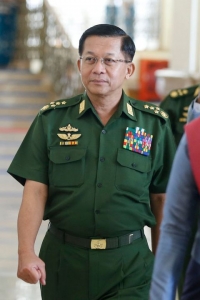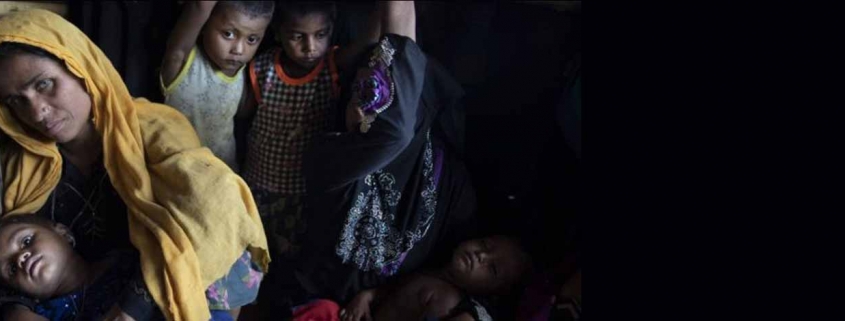U.N. report calls for Myanmar generals to be investigated, prosecuted for genocide and war crimes
A United Nations report asserted Monday that Myanmar’s military leaders, including the commander in chief, must be investigated and prosecuted for genocide, crimes against humanity and war crimes over their actions in ethnic and religious minority states — the strongest international condemnation yet of the military’s actions following a crackdown on Rohingya Muslims last August.
The report, the culmination of over a year’s worth of interviews, research and analysis by a U.N.-mandated fact-finding mission, significantly challenges the Myanmar military’s decades-long assertions, both in Rakhine state and elsewhere, that it is merely responding to security challenges posed to the state in the operations. The fact-finding mission went beyond the military’s actions in Rakhine and investigated the Myanmar military’s conduct more broadly since 2011, a time when the world was cautiously celebrating the country’s opening to the West and nominally democratic transformation.
It found “patterns of gross human rights violations and abuses committed in Kachin, Rakhine and Shan state” that “undoubtedly amount to the gravest crimes under international law,” a statement announcing the report’s findings said.
“Military necessity would never justify killing indiscriminately, gang raping women, assaulting children, and burning entire villages,” said the report. “The Tatmadaw’s tactics are consistently and grossly disproportionate to actual security threats, especially in Rakhine State, but also in northern Myanmar,” the report added, using the official name for the armed forces in Myanmar.
The fact-finding mission concluded that there is “sufficient information” to open a genocide and war crimes investigation of senior Myanmar generals. A spokesman for Myanmar’s armed forces could not be reached for comment.
On Monday, just after the U.N. report was released, Facebook took a rare step, removing 18 Facebook accounts, one Instagram account and 52 Facebook pages — including that of the commander in chief, Min Aung Hlaing — followed by 12 million people.

Myanmar’s commander in chief, Min Aung Hlaing. (HEIN HTET/EPA-EFE/REX/Shutterstock/Hein Htet/Epa-Efe/Rex/Shutterstock)
“International experts, most recently in a report by the U.N. Human Rights Council-authorized fact-finding mission on Myanmar, have found evidence that many of these individuals and organizations committed or enabled serious human rights abuses in the country,” Facebook said in a post. “We want to prevent them from using our service to further inflame ethnic and religious tensions.”
The data from their pages will be preserved, a Facebook spokeswoman said.
The report extends culpability for the humanitarian crisis in Rakhine state to Myanmar’s civilian government, led by Nobel laureate Aung San Suu Kyi. The civilian government, the report said, has failed to speak out against unfolding events, spread “false narratives,” oversaw the destruction of evidence in Rakhine state and blocked independent investigations.
“Through their acts and omissions, the civilian authorities have contributed to the commission of atrocity crimes,” it said.
The report will “have a big impact internationally, coming from the main U.N.-mandated body investigating the violence against the Rohingya, and also covering armed conflict in Shan and Kachin states,” said Richard Horsey, a former U.N. diplomat in Myanmar and long time Yangon-based analyst. “Its specific finding that there is sufficient grounds for investigation and prosecution of military commanders for genocide is likely to have particularly serious diplomatic, not only legal, consequences.”
The impact on the domestic narrative of what happened in Rakhine state, however, is less certain, he added. Myanmar’s government has rejected the mandate of the fact-finding mission from its inception.
A spokesman for Myanmar’s civilian government did not respond to request for comment. Myanmar’s civilian leaders have defended their handling of the crisis, asserting in private that they do not control the military generals nor their actions, but saying in public that they have a good relationship with the armed forces, are committed to resettling the hundreds of thousands of Rohingya that fled in the wake of the crackdown and are working to improve humanitarian conditions in Rakhine state.
The report also noted that Myanmar authorities “do not tolerate scrutiny or criticism” and have used various laws to arrest, detain or harass human rights defenders and journalists, pointing to the case against two Reuters journalistswho exposed the killings of Rohingya men in Inn Din, in Rakhine state, jailed since December. A verdict in their case was widely expected Monday, but was postponed until Sept. 3 in a highly unusual move. A court official said the judge presiding over the case was unwell and on medical leave.
“There may be a move by the government to review the case,” said Myint Kyaw, a member of the Myanmar Press Council. “In Myanmar, we cannot say that the judicial system is completely independent.”
The fact-finding mission, which presented the results of its inquiry in Geneva on Monday morning, has drawn up a list of alleged perpetrators that it believes must be prioritized for investigation and prosecution. These start with the commander in chief, who has so far avoided any sanctions or specific condemnation from international governments, including the United States and European Union. The mission’s report also named five other military commanders — deputy commander in chief Soe Win, Aung Kyaw Zaw, Maung Maung Soe, Aung Aung and Than Oo, all of whom led military divisions that carried out the operations in Rakhine state and elsewhere in Myanmar.
Maung Maung Soe was among the first to be sanctioned by multiple countries and was fired by the Myanmar military in June in a move widely seen as a way for more senior leadership to show they are taking some responsibility over last year’s crisis. He led the Western Command, which oversees Rakhine state, until last November. The decision, which according to a former high-ranking military official, was made by Min Aung Hlaing himself but was very unpopular within the military, who believed he was made a scapegoat of to protect more senior leadership.
Min Aung Hlaing, meanwhile, has continued to host international visitors and leaders, and has not been sanctioned by any foreign country or otherwise been punished internationally.
The U.N.’s fact-finding mission, which was established by the U.N. Human Rights Council, recommended that the Security Council refer the situation in Myanmar to the International Criminal Court, or create an ad hoc international criminal tribunal, and impose an arms embargo on Myanmar.
The U.N. Security Council meets Tuesday, but observers say it is unlikely that any decisive action will come from that body. China, a permanent member of the council and Myanmar’s northern neighbor, has defended Myanmar since the start of the crisis, and pledged development assistant in line with the government’s strategy in Rakhine state, seeing it as a way to regain leverage lost since Myanmar embarked on warmer relations with the West. Min Aung Hlaing, the commander in chief, recently visited Russia — another of the council’s permanent members — where he shopped for arms.
Another report is expected from the State Department, which has also embarked on its own investigation into the atrocities committed in Rakhine state. Secretary of State Mike Pompeo said in a tweet Sunday that that United States would “continue to hold those responsible accountable,” referring to the Myanmar military’s actions as “abhorrent ethnic cleansing.”
The U.N. fact-finding mission will present a fuller report with more detailed facts and legal analysts to the Human Rights Council on Sept. 18.
Wai Moe in Yangon contributed to this report.



